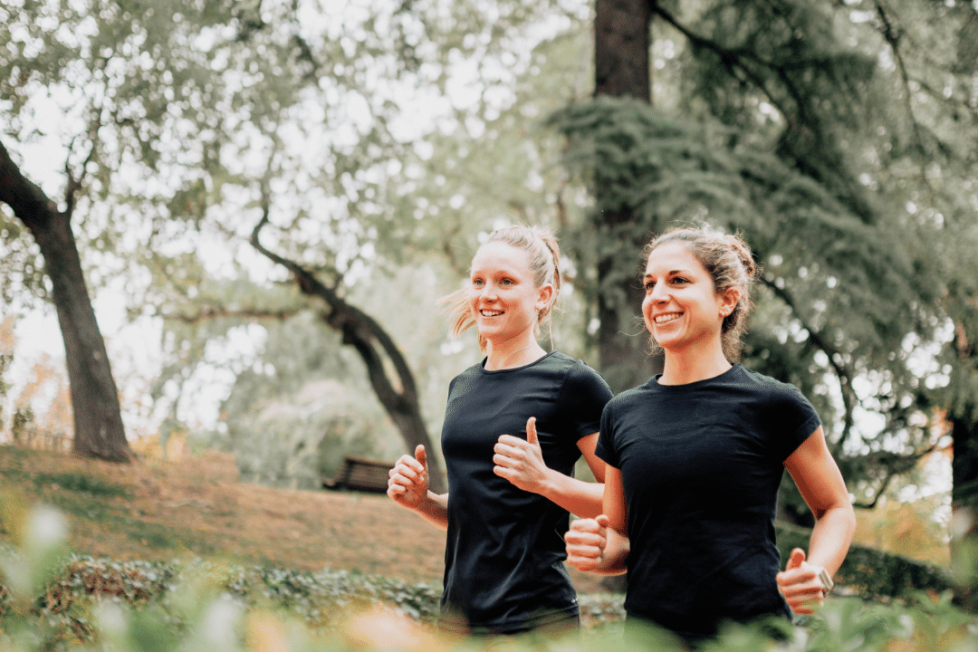The Benefits of Running (and Running With Friends)
In this article we answer running questions like: Does running actually strengthen the cartilage in your knees? (yes) and: What's the best way to run? (with friends).

In this article we answer running questions like: Does running actually strengthen the cartilage in your knees? (yes) and: What's the best way to run? (with friends).

Here at the Klubb, we believe that running is the purest form of sport—not to mention the oldest sport known to mankind. But thanks to popular myths like “running is bad for your knees”, sometimes running gets a bad rep. In this article, we are breaking down the our favorite episode of the Ultimate Health Podcast, where host Jesse Chappus chatted with Harvard professor Daniel Lieberman about why exercise is a modern behavior, why running is actually good for your knees, and the benefits of running with friends. If you are looking to make friends, check out this post on How to Make Friends as an Adult.
On the pod, Lieberman noted that studies of hunter-gatherers in Africa show that they do around 2.25 hours of moderate to vigorous physical activity everyday—which is a lot when you compare that number to the average American—who does only 12-20 minutes of moderate to vigorous physical activity all day.
“We’ve got machines to do all our labor for us, we dont have to do any physical activity anymore at all….so we had to invent exercise.”
Lieberman followed that, “Exercise is voluntary discretionary physical activity for the sake of health and fitness. Nobody did exercise until recently, it’s a completely modern invention, and as a result—surprise, surprise—most people don’t like to do it.” He added that, “asking somebody to go for a completely unnecessary run or jog or swim—or whatever it is—is an act of willpower…[and] you have to overcome deep instincts to do it.”
“Nobody enjoys the begginng of an exercise regime. If I go for a run, I never enjoy the first mile, ever…so even if you’re fit and good at something, you still have to get yourself out the door and overcome that inhibition.”
Daniel Lieberman on why getting out the door is the hardest part.
On the pod, Lieberman noted that play (e.g. playing sports) is a kind of training, but’s it can also give you fun and enjoyment. He followed that—especially due to the social element of play—there are all kinds of benefits.
“We evolved to be physically active for two reasons: when it was necessary or when it was rewarding, and play—sports for example—are obviously rewarding.”
On the pod, Lieberman noted that if you’re inactive, even an hour a week (10 minutes a day) of moderate to vigorous activity can reduce your relative risk of mortality by 30%. If you get up to 21 minutes of exercise a day, you can lower your mortality rate by 50%. In other words, you don’t need to run marathons or swim across the English channel to get the benefits of exercise: “Set your targets realistically, get up to something, because something is better than nothing, always.”
On the pod, Lieberman noted that, “walking is the most fundamental form of physical activity, it’s what we evolved to do. Typical hunter gathers walk 9 to 15 kilometers a day…walking is fundamental, and important, and basic, and all of us should walk.” He followed that, while walking is our biological base, sometimes it’s good to get your heart rate up by running, carrying something, or dancing.
On the pod, Lieberman noted that knee arthritis is one of the most common musculoskeletal problems that people have, and a lot of people are worried that running will ruin their knees.
“It’s kind of like a wear and tear idea, that you’re basically using your knees like the shock absorbers in your car and the more you do it the more you’re going to wear them out. That is fundamentally—completely—not true, we can dispel that myth 100%.”
He followed that there is actually a fair amount of evidence to the contrary:
“Running actually stimulates repair and maintenance mechanisms that actually help strengthen the cartilage in the knee.”
Daniel Lieberman, Harvard
Lieberman noted that we evolved to exercise for two reasons:
“So for people who are struggling to exercise, you have to find ways to make it both necessary and socially rewarding, and the best way of doing that is to exercise with friends.”
He followed that it helps to, “make it social. If you make it social, you have a commitment, but you also have reinforcement and you have encouragement and all that good positive feedback. You get it all in one and that’s how we evolved to be physically active—in groups.”
